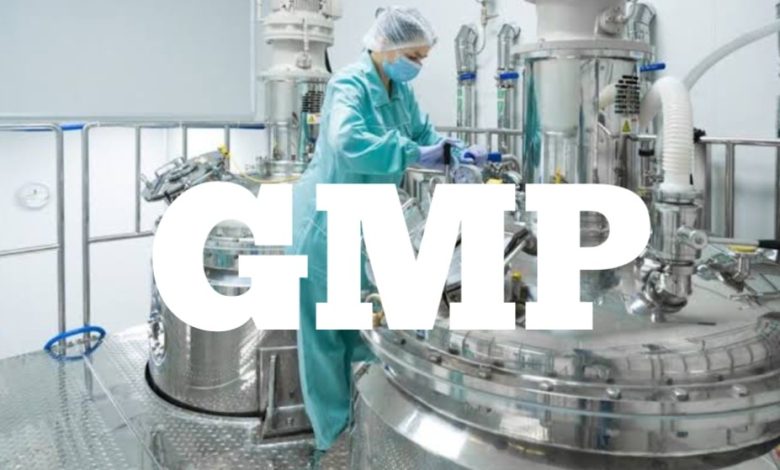GMP Certification: Guidelines, Benefits, Penalties

What does GMP stand for?
GMP stands for “Good Manufacturing Practice,” and it is a set of guidelines that ensures the quality and safety of pharmaceutical products during the manufacturing process. GMP guidelines are established by regulatory agencies such as the US Food and Drug Administration (FDA) and the European Medicines Agency (EMA) and are enforced to ensure that pharmaceutical companies comply with the regulations.
GMP guidelines are based on the principles of quality assurance and quality control, which cover all aspects of the manufacturing process, including the equipment used, the environment in which the products are produced, the procedures followed, the training of personnel, and the documentation of all processes and procedures.
The history of GMP in pharmaceuticals can be traced back to the early 1900s, when the US government established regulations to ensure the purity and strength of drugs. These regulations were initially focused on the labeling of drugs, but later expanded to cover manufacturing practices. In the 1960s, GMP guidelines were developed and enforced by regulatory agencies around the world to ensure that pharmaceutical companies comply with the standards for quality and safety.
Today, GMP is a critical component of pharmaceutical manufacturing, and companies must adhere to strict guidelines to ensure the quality and safety of their products. GMP guidelines are regularly updated to reflect advances in technology and changes in regulatory requirements, and pharmaceutical companies must stay up-to-date with these changes to remain in compliance.
GMP Guidelines In Pharmaceuticals
The Good Manufacturing Practice (GMP) guidelines in pharmaceuticals are a set of regulations and standards that ensure the quality, safety, and efficacy of pharmaceutical products. These guidelines are established by regulatory agencies such as the US Food and Drug Administration (FDA), the European Medicines Agency (EMA), and other national and international regulatory bodies.
The GMP guidelines cover all aspects of the manufacturing process, from the raw materials used to the finished product. The guidelines ensure that the manufacturing process is controlled and documented and that all necessary procedures are followed to produce a product that is of the required quality.
Some key elements of the GMP guidelines in pharmaceuticals include:
1. Quality Management Systems (QMS): The pharmaceutical company must have a QMS in place to ensure that the products are consistently produced and controlled according to the required quality standards.
2. Facility and Equipment: The manufacturing facility and equipment used must be designed, installed, and maintained to prevent contamination, ensure product quality, and maintain the integrity of the manufacturing process.
3. Personnel: The personnel involved in the manufacturing process must be adequately trained, qualified, and experienced to perform their duties and responsibilities.
4. Documentation: All aspects of the manufacturing process, including procedures, batch records, and specifications, must be documented and controlled.
5. Validation: The manufacturing process and equipment used must be validated to ensure that they consistently produce a product of the required quality.
6. Quality Control: The product must undergo quality control testing to ensure that it meets the required specifications before it is released for sale.
Compliance with GMP guidelines is essential for pharmaceutical companies to ensure that their products are safe, effective, and of the required quality. Regulatory agencies regularly inspect pharmaceutical manufacturing facilities to ensure compliance with GMP guidelines, and failure to comply can result in penalties, fines, and even legal action.
What Does it Mean to Be GMP Certified?
“GMP certified” refers to the certification that a pharmaceutical company or manufacturing facility has obtained, indicating that it meets the Good Manufacturing Practice (GMP) guidelines. This certification is awarded by regulatory agencies such as the US Food and Drug Administration (FDA) and the European Medicines Agency (EMA), as well as other national and international regulatory bodies.
To become GMP certified, a pharmaceutical company or manufacturing facility must undergo a rigorous inspection by the regulatory agency to ensure that it meets the GMP guidelines. The inspection covers all aspects of the manufacturing process, including the facility, equipment, personnel, documentation, and quality control procedures.
Once the company or facility has passed the inspection, it is issued a GMP certification, which indicates that it has met the required standards for quality, safety, and efficacy. The certification is valid for a specified period and must be renewed periodically to ensure that the company or facility continues to meet the GMP guidelines.
GMP certification is essential for pharmaceutical companies to operate in the market and ensure that their products are safe, effective, and of the required quality. It also helps to build trust and confidence among consumers and regulatory agencies, which is critical for the success of the company in the long run.
Benefits Of Gmp Certification
The benefits of Good Manufacturing Practice (GMP) certification for a pharmaceutical company or manufacturing facility are numerous, including:
1. Compliance with Regulatory Requirements: GMP certification ensures that the company or facility is compliant with regulatory requirements and guidelines established by regulatory agencies such as the US Food and Drug Administration (FDA) and the European Medicines Agency (EMA).
2. Improved Product Quality: GMP guidelines ensure that the manufacturing process is controlled and documented and that all necessary procedures are followed to produce a product that is of the required quality. This results in improved product quality and consistency.
3. Enhanced Customer Confidence: GMP certification helps to build trust and confidence among customers, regulatory agencies, and other stakeholders, as it demonstrates the company’s commitment to producing safe, effective, and high-quality products.
4. Increased Market Access: GMP certification is a requirement for selling pharmaceutical products in many countries, including the US and the EU. Therefore, certification increases market access and expands the company’s potential customer base.
5. Competitive Advantage: GMP certification can provide a competitive advantage over other companies that do not have certification, as it demonstrates the company’s commitment to quality and compliance with regulatory requirements.
6. Continuous Improvement: GMP guidelines require continuous improvement and ongoing monitoring of the manufacturing process, which can lead to increased efficiency, reduced costs, and improved product quality over time.
In summary, GMP certification is essential for pharmaceutical companies to ensure compliance with regulatory requirements, improve product quality, enhance customer confidence, increase market access, and gain a competitive advantage.
Penalties For Violating Good Manufacturing Practice (GMP) Guidelines
Penalties for violating Good Manufacturing Practice (GMP) guidelines in the pharmaceutical industry can vary depending on the severity of the violation and the regulatory agency involved. However, in general, the penalties for GMP violations can be quite severe, and can include the following:
1. Warning Letters: Regulatory agencies such as the US Food and Drug Administration (FDA) can issue warning letters to pharmaceutical companies that violate GMP guidelines. These letters can require the company to take corrective action or face further penalties.
2. Fines: Companies that violate GMP guidelines may be subject to fines or monetary penalties. The amount of the fine can vary depending on the severity of the violation and the regulatory agency involved.
3. Suspension or Revocation of Licenses: Pharmaceutical companies that repeatedly violate GMP guidelines may have their licenses suspended or revoked, effectively preventing them from operating in the market.
4. Product Recall: If a pharmaceutical company produces a product that violates GMP guidelines, it may be required to recall the product from the market, which can result in significant financial losses and damage to the company’s reputation.
5. Criminal Charges: In some cases, severe GMP violations can result in criminal charges against the company or individuals involved in the violation.
In addition to these penalties, GMP violations can also lead to a loss of investor confidence, negative media attention, and damage to the company’s reputation. Therefore, it is critical for pharmaceutical companies to maintain strict adherence to GMP guidelines to avoid any penalties and ensure the safety and efficacy of their products.





